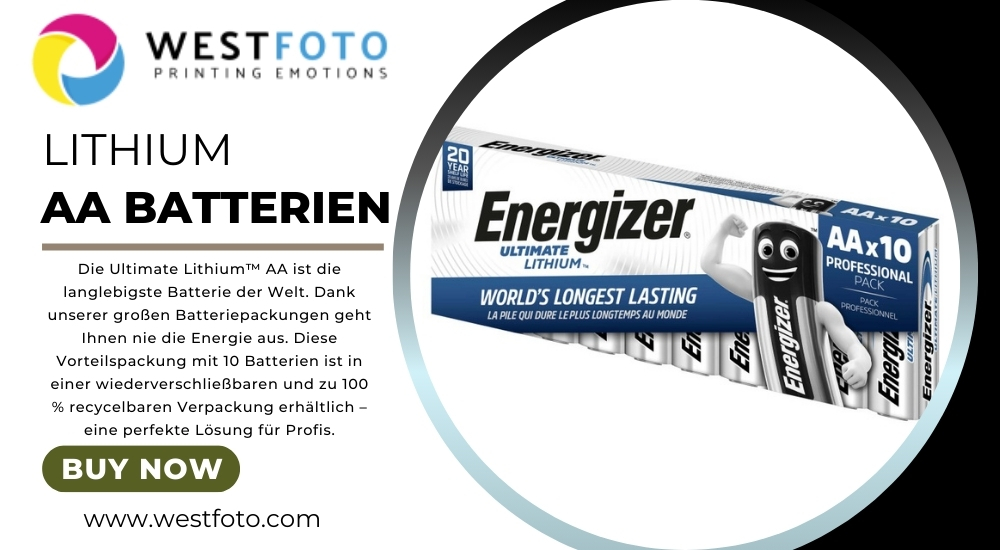In the world of portable power, the choice between Lithium AA Batterien and LR6 batteries (alkaline) often sparks debates among consumers. Each type has its own set of advantages and drawbacks, catering to different needs and preferences. Let us explore the pros and cons of both to help you make an informed decision on which battery is best suited for your devices.
Lithium AA Batteries:
Pros:
- Longer Lifespan: One of the standout features of Lithium AA Batterien is its impressive lifespan. They generally outlast alkaline batteries, making them ideal for high-drain devices like digital cameras and certain electronics.
- Lightweight Design: Lithium batteries are significantly lighter than their alkaline counterparts. This weight reduction is particularly beneficial for portable devices where minimizing overall weight is crucial.
- Performance In Extreme Temperatures: Lithium batteries perform exceptionally well in both high and low-temperature environments. They can endure extreme conditions, making them suitable for outdoor activities and devices that may be exposed to varying climates.
- Higher Voltage Stability: Lithium batteries maintain a more stable voltage throughout their lifespan compared to alkaline batteries. This stability is advantageous for devices that require consistent power output for optimal performance.
- Less Environmental Impact: Lithium batteries are considered more environmentally friendly than alkaline batteries. They typically contain fewer toxic materials and are easier to recycle, contributing to a reduced environmental footprint.
Cons:
- Higher Cost: The primary drawback of Lithium AA Batterien is their higher upfront cost. While they offer a longer lifespan and better performance, the initial investment can be a deterrent for budget-conscious consumers.
- Limited Availability: Lithium batteries may not be as widely available as alkaline batteries in certain regions. This can be a consideration, especially when traveling or in emergencies where replacements are needed quickly.
- Non-Rechargeable: Unlike some alkaline batteries, most Lithium AA Batterien are non-rechargeable. This means additional costs over time and the environmental impact of disposing of used batteries.
LR6 Batteries (Alkaline):
Pros:
- Cost-Effective: Alkaline batteries, including LR6, are generally more budget-friendly than lithium batteries. This makes them an attractive option for everyday devices, especially when the lower cost aligns with the expected usage.
- Widespread Availability: Alkaline batteries are widely available in most stores, making them convenient to replace in various locations. Their accessibility is a significant advantage for consumers who prioritize convenience.
- Rechargeable Options: Unlike traditional alkaline batteries, some LR6 Batteries come in rechargeable variants. This option can provide cost savings over time and reduce the environmental impact associated with disposable batteries.
- Compatibility: LR6 Batteries are compatible with a wide range of devices, from household electronics to children’s toys. Their versatility makes them a go-to choice for many consumers.
- Lower Initial Cost: The lower upfront cost of alkaline batteries is often a decisive factor for those seeking a cost-effective solution for low-drain devices.
Cons:
- Shorter Lifespan: Alkaline batteries generally have a shorter lifespan compared to lithium batteries, particularly in high-drain devices. This means more frequent replacements, potentially offsetting the initial cost savings.
- Weight & Voltage Drop: Alkaline batteries are heavier than lithium batteries, which can be a consideration for devices where minimizing weight is essential. Also, LR6 Batteries experience a gradual drop in voltage as they are used. This can affect the performance of devices that rely on consistent power output.
- Environmental Impact: Traditional alkaline batteries can have a more significant environmental impact due to the materials they contain. While recycling options exist, they may not be as environmentally friendly as lithium batteries.
Which One Should You Use?
The choice between Lithium AA Batterien and LR6 batteries ultimately depends on your specific needs and priorities. If you prioritize a longer lifespan, better performance in extreme conditions, and a lighter weight, Lithium AA batteries may be the ideal choice.
On the other hand, if you seek a cost-effective solution for everyday devices with widespread availability, LR6 Batteries may be more suitable. Consider the intended use of the batteries, the devices they will power, and your budget constraints.
To know more about these products visit our website www.westfoto.com/.





















